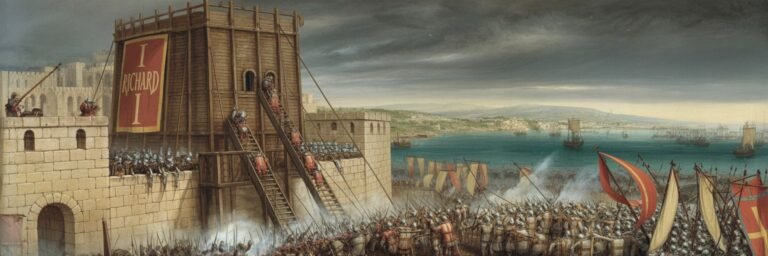INTRODUCTION
A millennia ago, the medieval world was stirred into a sweeping, religiously charged military endeavor known as the Crusades. This historically significant phenomenon, spanning from the 11th to the 15th century, was fueled by an intricate interplay of faith, politics, and economics that forever changed the course of Western and Eastern civilizations.
Understanding the cultural legacy of the Crusades often goes beyond the tales of knights, emperors, and popes. It delves into centuries-old dramas that unfolded on the battlefields, and which have had an everlasting impact on our modern society – whether acknowledged or simply ingrained.
HISTORICAL BACKGROUND
The Crusades originated in the late 11th century against a backdrop of emerging religious fervor across Europe. The rallying cry came from Pope Urban II in 1095 AD, following pleas from the Byzantine Empire for aid against the expanding Seljuk Turks.
In a legendary speech at the Council of Clermont, he beckoned European Christian knights to journey eastward to reclaim the Holy Land, particularly Jerusalem, from the Muslims. Thus began a series of religious wars that would span two centuries, encompass eight major crusades, and indelibly leave its mark on two continents and three religions.
THEORIES AND INTERPRETATIONS
Historians have long argued about the motivations behind the Crusades. One widely accepted interpretation, championed by traditionalists such as Steven Runciman, is that these were purely religious campaigns, motivated by piety and the desire to visit or reclaim Christian holy sites.
However, revisionist historians like Christopher Tyerman and Thomas Asbridge have argued that economic and political motivations were just as important. The Crusades offered an avenue for second sons, who often didn’t inherit, to obtain land and wealth. For powerful European monarchs, they provided opportunities to extend their influence in the Byzantine Empire and beyond.
Among the more controversial theories is the notion that the Crusades served as a form of early colonialism. Scholars like John France and Jonathan Riley-Smith suggest that Crusaders established the foundations of a Western colonial empire in the Middle East, often invoking parallels with later European imperialism.
MYSTERIES AND CONTROVERSIES
The history of the Crusades is not without its mysteries and controversies. The motivations of individual Crusaders, for instance, remain a point of contention. While some clearly sought spiritual redemption or material wealth, the motivations of others are less clear.
Then, there’s the extent of the violence carried out in the name of religion. While it is undeniable that atrocities occurred on a staggering scale during the Crusades, the extent and nature of this violence, including the infamous sack of Jerusalem in 1099, is often amplified or downplayed according to one’s ideological viewpoint.
SYMBOLISM AND CULTURAL SIGNIFICANCE
The Crusades have proven to be incredibly potent in symbolic terms. The cross, which Crusaders wore on their garments as a sign of their vow, became an enduring symbol of Christianity’s struggle against ‘unbelievers.’ The term ‘crusade’ itself now means any vigorous campaign for change, not necessarily religious.
Culturally, the Crusades led to a blending of Western and Muslim cultures, which can be seen in areas such as architecture, science, and literature. Both regions were enriched and expanded by this intermingling, shaping aspects of modern Western and Middle Eastern societies.
MODERN INVESTIGATIONS
New light continues to be shed on the Crusades and their legacy through modern research methods. Archaeological excavations are revealing new insights into the lives of the Crusaders, while genetic studies are uncovering fascinating evidence of intermarriage and integration.
Historians are re-evaluating earlier narratives, incorporating perspectives from Muslim and Jewish sources that were often glossed over. This is gradually leading to more nuanced interpretations of the Crusades’ impacts, beyond simplistic frameworks of clash or collaboration between cultures.
LEGACY AND CONCLUSION
Ultimately, the legacy of the Crusades is nuanced and complex. For many in the West, they represent a romanticized era of chivalry and heroism, yet simultaneously, they remind us of religious intolerance and violence. In contrast, for many Muslims and Jews, they symbolize a period of devastating loss, brutality and enduring trauma.
Whether viewed as religious wars, early imperial ventures, or something altogether different, their cultural impact is undeniable. Enduring stereotypes about the ‘other,’ whether Christian, Muslim or Jew, can often be traced back to these events.
The Crusades remain a poignant reminder of the human capacity for both unity and division. In delving into their history, we discover much about our shared past and gain insights into contemporary religious and cultural conflicts. As we continue to grapple with their legacy, we face, perhaps, the Crusades most enduring lesson: conflict driven by ideology promises neither glory nor easy resolution, only the echoes of history that continue to shape our world today.



